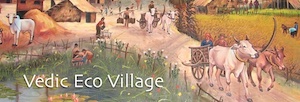The science of Vastu is closely connected with architecture, village and city planning, construction and many other aspects of our daily lives.
For example, in designing the Gurukula Colony, according to Vastu, the Yajna Shala and the kitchen (fire) will be located on the SE side of the colony while the pond (water) will be situated on the NE side of the colony. According to Vastu principles, the roads will be at right angles.
Sanskrit treatises include chapters on architecture of temples, homes, villages, towns, fortifications, streets, shop layout, public wells, public bathing, public halls, gardens, river fronts among other things.
Vāstu takes the meaning of "the site or foundation of a house, site, ground, building or dwelling-place, habitation, homestead, house". The underlying root is vas "to dwell, live, stay, reside".
The science of Vastu is closely connected with architecture, village and city planning, construction and many other aspects of our daily lives.
For example, in designing a colony according to Vastu, the Yajna Shala and the kitchen (fire) will be located on the SE side of the colony while the pond (water) will be situated on the NE side of the colony. According to Vastu principles, the roads will be at right angles.
Sanskrit treatises include chapters on architecture of temples, homes, villages, towns, fortifications, streets, shop layout, public wells, public bathing, public halls, gardens, river fronts among other things.
Vāstu takes the meaning of "the site or foundation of a house, site, ground, building or dwelling-place, habitation, homestead, house". The underlying root is vas "to dwell, live, stay, reside".
